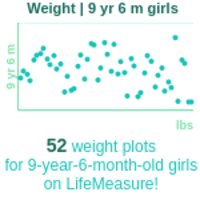Girls Weight chart for Children 9 years & 6 months old

General Summary: 9 year & 6 month old girls weight
In most cases, weight measurements for 9 year & 6 month old girls will be in the range between 50 and 104 lbs. The average weight for 9 year & 6 month old girls is 68 lbs, according to the CDC and anonymized data from users.
All Results
Enter your weight measurements above to see how they compare
So far, we have recorded 0 weight measurements for 9-year-6-month girls on LifeMeasure!
(chart updates daily)
CDC Growth Data for 9.5-Year-Old Girls:
According to CDC growth charts, the average weight for a 9-and-a-half-year-old girl is around 70 pounds (31.8 kilograms). Here are the weight measurements at different percentiles:
5th percentile weight: Approximately 61 pounds (27.7 kilograms)
50th percentile weight: Around 70 pounds (31.8 kilograms)
95th percentile weight: Approximately 80 pounds (36.3 kilograms)
Developmental Milestones for 9.5-Year-Old Girls:
Physical Development
Gross motor skills:
Refining coordination, balance, and overall physical abilities
Participating in sports and physical activities with increased skill and strategy
Developing more specialized skills in specific sports or activities
Cognitive Development
Language development:
Expanding vocabulary and using complex language structures
Developing stronger reading comprehension and writing skills
Engaging in critical thinking and expressing thoughts with clarity
Social and Emotional Development
Developing independence:
Demonstrating increased autonomy and decision-making skills
Developing a stronger sense of personal values and beliefs
Navigating social relationships with greater confidence
Developing empathy and perspective-taking:
Understanding others' perspectives and showing empathy in social interactions
Demonstrating kindness, consideration, and respect towards others
Developing conflict resolution skills and understanding compromise
Fine Motor Skills
Improved fine motor control:
Writing with increased speed and legibility
Manipulating smaller objects with precision and dexterity
Developing skills in activities such as drawing, painting, and playing musical instruments
Feeding and Nutrition
Balanced meals:
Encouraging a variety of nutritious foods
Promoting healthy eating habits and mindful food choices
Involving your child in meal planning and preparation
Sleep Patterns
Nighttime sleep:
Needing about 9 to 11 hours of sleep at night
Maintaining a consistent bedtime routine
Creating a comfortable and conducive sleep environment
Daytime rest:
Most children of this age no longer require daytime naps
Encouraging restful breaks and relaxation throughout the day
Parenting Tips for the Ninth and a Half Year
Foster independence and responsibility:
Encouraging your child to take on more responsibilities at home and school
Allowing her to make decisions and solve problems independently
Supporting her in setting goals and managing her time effectively
Encourage critical thinking and creativity:
Stimulating your child's curiosity and encouraging exploration of new ideas
Engaging in activities that foster critical thinking and problem-solving skills
Supporting her in pursuing her interests and hobbies
Nurture positive self-esteem and body image:
Promoting a healthy body image and self-acceptance
Encouraging a positive attitude towards personal strengths and challenges
Modeling and encouraging healthy habits for physical and emotional well-being
Remember, every child develops at their own pace, and these milestones are general guidelines. If you have any concerns about your child's development or well-being, consult with her pediatrician for personalized guidance and support.
See more ages